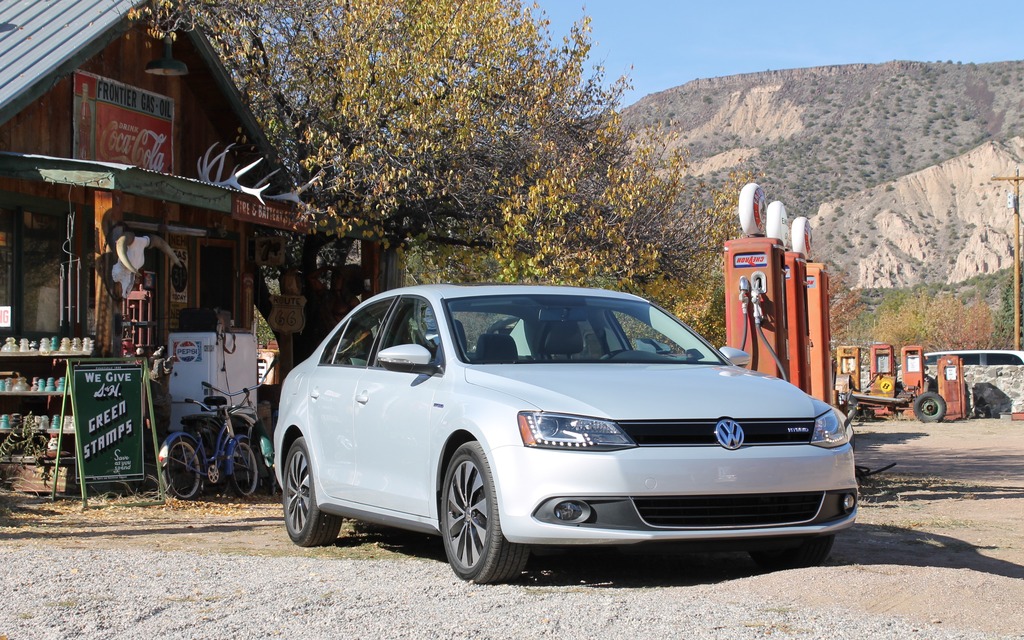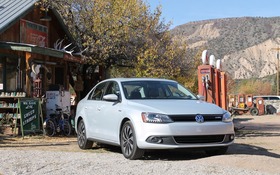2013 Volkswagen Jetta Hybrid: The Lone Cowboy of the Hybrid World

| Strong points |
|
|---|---|
| Weak points |
|
Santa Fe, New Mexico – Volkswagen wants to market its first hybrid in Canada as a fun vehicle to saddle up (did you notice that the Touareg Hybrid never came to our country?). And I’m certainly not going to contradict them!
Yes, the Jetta Hybrid is nice to drive. It doesn’t display any of the anemic lack of vigour that we normally see in hybrids (at least, those available for a reasonable price). In fact, this Volkswagen hybrid is so different from its competitors that we can forgive the manufacturer for its tardy arrival in showrooms. After all, the first hybrids rolled onto the Canadian market 12 years ago already.
One, two, three
So, what about those differences? First, the Jetta Hybrid has taken a different route than the Prius by placing an electric drivetrain in a sedan that already has a reputation for solid German handling.
Second, the Jetta Hybrid comes equipped with some exclusive yet discreet visual elements, including its front grille, wheels and more. None of it screams “Green!” at you, but combined they amount to a 7% improvement on aerodynamics.
Third, the manufacturer tossed its lasso and roped in some interesting components, such as a the Jetta GLi’s rear multi-link suspension. In my opinion, it’s one of the best things that Volkswagen could have done. Same thing goes for the laminated glass that’s thicker where needed for improved soundproofing.
…Turbo!
Another good move by Volkswagen was to avoid the CVT bandwagon and offer a seven-speed dual-clutch transmission. Yessir, that’s DSG with – don’t laugh – Sport mode. What is more, the steering has been tuned just right, so that the power assistance is not too obvious.
Instead of betting on an all-new engine (and all the investments that it would have required), the folks at Volks used the same 1.4L 4-cylinder turbo with direct injection developed for the new Golf and Audi A3. You got that right – a turbo engine in a hybrid! That’s like wearing a Stetson to a Tupperware party!
But what about its electric heart? Obviously, there are lithium-ion batteries. There’s also a parallel electric drive system (in which the electric motor is integrated into the transmission) like in the Touareg Hybrid. But, according to the engineers, “It’s not the same engine, it’s not the same transmission and it’s not the same battery pack.”
What about the boost?
Tally up all these differences and the Jetta Hybrid drives like a normal Jetta, even on the range north of Santa Fe, New Mexico (aka cowboy country, if there ever was one). It is solid, almost sporty. The suspension is a little on the sporty side and no one could call it under-powered. The combined power comes to 170 horses and 184 lbs.-ft. of torque. And that’s for a vehicle that, at 1,505 kg, weighs just a hundred kilos more than the 2.5L Jetta.
Press your boot into the pedal and you’ll find that its accelerations are smooth and gentle. Of course, the horses take a second to charge into action, but once they do, you’re off like it’s nobody’s business. The vehicle accelerates with pure transparency, galloping its way from 0-100 km/h in 8.6 seconds – and that’s what matters.
A gentleman’s promise
Another thing that counts is fuel consumption. Volkswagen has only posted one rate: a combined 45 mpg in the U.S., according to five-cycle tests. In comparison, the Toyota Prius claims 50 mpg.
You probably figure that, in Canada, those numbers would translate to 5.23 L/100 km, right? Wrong. You see, in our wild country, we still use two-cycle tests. Thus, the advertised rate on our side of the frontier is 4.4 L/100 km.
So, for once, we are pleasantly surprised by a hybrid’s electric range – a no doubt because Volkswagen remained very conservative with its promises. All-electric mode kicks in often, and you can go up to 70 km/h without being too shy on the accelerator.
But what about when your battery is running low? The electric motor doesn’t hesitate to jump into action. When the electricity gauge has bottomed out, its colour soon returns after a few instances of braking or decelerating (because that’s when the combustion engine disengages, allowing you to leverage the vehicle’s momentum). I really liked the electric drivetrain’s flexibility as well as the fact that it is both easy to operate and access.
Reality check
So, the question on every buckaroo’s mind is, “Just how much gas does she drink?” Indeed, this is an important question for a car that: A) only has a 45-litre tank, which is 10 litres less; and B) starts at $27,875, which is $4,000 more than a Jetta with similar equipment and power. (The Hybrid costs $2,500 more than the Jetta TDI Diesel, while the Prius starts at $26,000.)
A four-part answer to the fuel consumption question:
1) On our 30-km test, we obtained 43 mpg (roads and highways) which is 5.47 L/100 km.
2) Going uphill – up to 8,580 feet above sea level – this average was shot dead: 34.4 mpg, which is 6.86 L/100 km.
3) In Taos, which is rife with stops and where traffic never moves faster than 70 km/h, the Jetta remained in all-electric mode for nearly 8 km. In fact, it could have done more, but the GPS announced that we had reached our destination.
4) On the way back to Santa Fe, a downhill drive, the Jetta obtained nearly 55 mpg, which is 4.28 L/100 km.
The Buffalo Bill of electric range
During our test drive, we wanted to push the envelope a little further by sticking to city driving for roughly 10 kilometres with a fully charged battery. The onboard indicator then read . . . 97.6 mpg. That’s 2.41 L/100km! But we refrained from hootin’ and hollerin’ despite these phenomenal results because we figured that more testing was in order – especially in winter conditions.
Even though this point has yet to be confirmed, my impression of the newest Volkswagen hybrid is that it doesn’t have the typical hybrid quirks. Sure, it has a few faults here and there, such as the fact that the cargo space has been reduced by one third due to the batteries (it’s now 320 litres) – but at least the rear bench folds down and there’s a trunk pass-through under the armrest. Another thing: turbo engines tend to require super gas, which is kind counterproductive if you want to save money on fuel, isn’t it?
Hybrid or diesel?
So the big question here is, between the Hybrid and the TDI, which will still be standing at dawn? Or maybe Volkswagen is right in thinking that the Hybrid will actually attract new customers who would never have considered the TDI.
One thing is certain: even if the city/highway fuel consumption rates have yet to be revealed (we’re expecting to get them at the Montreal International Auto Show at the same time as the first Jetta Hybrids), VW’s friendly engineers have let it slip that even on the highway (currently TDI territory), the Jetta Hybrid is expected to be the most frugal.











